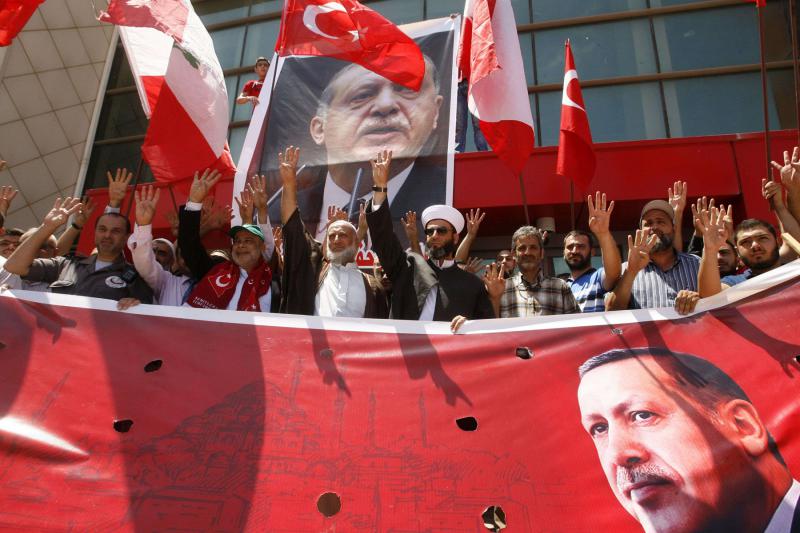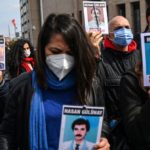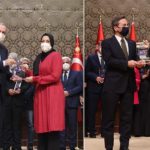Saudi Arabia’s move to distance itself from Lebanon has left room for Turkish manoeuvres to expand Ankara’s influence in the country. Turkey, observers say, is now proclaiming itself as a “protector of Sunnis” in Lebanon, a role that has been long associated with Saudi Arabia over the past decades.
The Secretary-General of the Islamic Group in Lebanon, Azzam al-Ayoubi has recently sparked controversy, by calling on the Lebanese to draw “inspiration” from the Turkish model, at a time when the country needs to be protected from foreign meddling and facing threats to its sovereignty, especially with Iran’s control via Hezbollah.
“Part of what preoccupies the thinking of Sunni Muslims in Lebanon is the role that Turkey can play in the country for their benefit, based on their search for a way to restore the lost balance in Lebanon,” Ayoubi’s said during a symposium organised by the Studies and Research Forum under the title “The Turkish Renaissance and Its Impact on the Sunni Community in Lebanon.”
“Sunni Muslims in Lebanon look to any force that can support them to achieve domestic balance and this comes as they feel weak compared to other social and political components,” he added.
Ankara is obviously investing in Riyadh’s retreat from the Lebanese political scene, especially following the massive Beirut port explosion last year.
According to observers, Riyadh’s apathy has created a vacuum that encouraged Ankara to promote the so-called Turkish model in Lebanon via its agents and subordinates, who claim that a role by Turkey could bring about a domestic balance between the different Lebanese sects.
Riyadh did not hide its dissatisfaction with political developments in Lebanon, even before the explosion. It had stopped providing economic aid to the country and downgraded its diplomatic mission in Beirut.
According to senior Saudi officials, Riyadh believes that the Lebanese state has completely fallen under Hezbollah’s sway, which prevents Saudi Arabia’s presence in Lebanon, whether politically or in investment matters.
Political sources who have been monitoring Turkish moves in Lebanon told The Arab Weekly that Ankara wants to fill the Arab vacuum, playing, to this end, the sectarian card through its charitable and Islamist arms in the country.
Turkey, they said, has devised several strategies to infiltrate the Sunni community in Lebanon, using Islamists groups, exploiting humanitarian aid and taking advantage of the difficult economic situation in the country.
Sunni political forces, feeling increasingly weak, have so far attempted to take advantage of the Turkish push to expand Ankara’s influence in Lebanon.
The weakness of Sunni political forces, experts say, make them predisposed to be exploited, with Tripoli and northern Lebanon possibly turning into a fertile incubator for the Turkish project.
The Turkish intervention, however, will not likely be limited to the north, as sources in the country say that there has been an attempt at expanding this influence towards the city of Sidon in southern Lebanon, through Ankara’s contribution to financing the construction of a burns unit.
Prior to the deadly blast at Beirut port, there had been a political debate between two Sunni political figures over who is loyal to Saudi Arabia and who is loyal to Turkey in Lebanon.
Asas Media, a website administered by former interior minister close to Saudi Arabia, Nihad al-Machnouk, has accused former Lebanese security director and Justice Minister Ashraf Rifi of working with Turkish intelligence to take control of northern Lebanon.
Rifi responded violently to Machnouk, describing him as someone who kept moving “from one intrigue to the other and only the employer changes.”
Machnouk and Rifi at some point competed for Saudi attention when the Saudi fortunes of the former Lebanese prime minister and head of the Future Bloc Saad Hariri declined.
Observers consider that the apathy of Arab countries has pushed the Sunnis to consider a Turkish role in order to counter Iran’s control over Lebanon.
Meanwhile, Ankara, the observers say, has greatly benefited from divisions and differences among Sunni political forces in Lebanon to push for the creation of a new political situation.
“The Sunnis in Lebanon are looking to Turkey because, during the last decade, it has stood by peoples who felt persecuted and oppressed and most of these peoples were Sunni Muslims,” Ayoubi said.
However, a Lebanese politician, queried by The Arab Weekly on Ankara’s growing role in Lebanon, stressed the need to “distinguish between the appreciation that the Lebanese Sunnis, especially in Tripoli, hold for Turkey and being loyal to it,” noting that Lebanon’s Sunnis generally sympathise with anyone opposing the Assad regime in Syria.
He explained that the Sunnis in general are allergic to anyone who deals with Syrian President Bashar Assad in light of their bitter experience with the Syrian regime, due to its sectarian (Alawite) nature. This sectarian nature appeared specifically in Tripoli, where the Alawites, during the period of the Syrian tutelage over Lebanon up to 2005, turned into something like masters of the city, despite the fact that they formed only a small minority in it.
Source: Arab Weekly
***Show us some LOVE by sharing it!***



